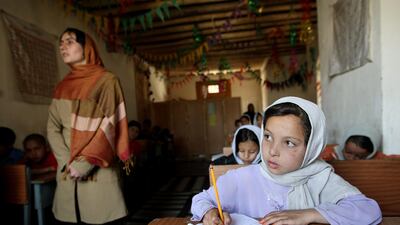American policy towards withdrawal from Afghanistan served to build up the Taliban to the point where it could sweep forward to capture more than half the country's provincial capitals, the former British ambassador to the country has said.
Sir William Patey said the impact of policies pursued by both former president Donald Trump and President Joe Biden was to boost the extremists even though its negotiators had made no concessions at the peace table in return.
The UK envoy in Kabul from 2010 to 2012 still retains an interest in the country as chairman of Turquoise Mountain, one of Afghanistan's biggest charities.
“The precipitous decision began by Donald Trump and continued by Joe Biden to bring the troops out without any agreement with the Taliban, other than supposedly a ceasefire and Taliban prisoners would be released, is one of the most abject failures of diplomatic strategy since the Vietnam War,” he told The National.
“The Americans withdrew their troops and the Taliban have concluded they don't need to do a deal because they can take the whole country.”
Pointing to the key role played by US Afghanistan envoy Zalmay Khalilzad since his appointment in 2018, Sir William said the culmination of his work over the two administrations could be seen in the events on the ground in recent weeks.
“He was clearly given a remit to get the troops out and nothing else,” he said. “Now, he tried his best to get the troops out as part of a political deal but the Taliban were having none of it.
“They must have smelt that the Americans were desperate to leave and therefore waited out the Americans.”
With freshly released prisoners swelling their ranks, the Taliban was handed the second gift of a shattering psychological blow dealt to the official Afghan forces and state institutions by Mr Biden's deadline for withdrawal this summer.
“This has produced a crisis of confidence in the Afghan security forces and the Afghan people which has facilitated the Taliban's march through the country in such a short space of time,” Sir William said.
“The Taliban could never have fought their way through like they have if there had been any real resistance but people were hedging their bets and switching sides,” he added.
“These have not been big battle formations. All you have to do is take the governor's office, a local police station or the security headquarters, free the prisoners and you've gained the city.”
Taliban showing no signs spots have changed
Sir William said there was so far no sign that the Taliban were any different from the group of zealots that imposed a harsh regime on Afghanistan in the late 1990s. One test could be the fate of the artisans and families that have benefited from the work of his charity, Turquoise Mountain.
“The people that Turquoise Mountain have helped produce goods for export,” he said. “I don't see why the Taliban would be against exporting carpets, exporting jewellery, exporting woodwork, exporting Islamic art and calligraphy. These are all aspects of Islamic culture being produced by Afghans and being sold overseas.
“I can't see why they would object to that but the trouble is, we don't know yet.”
Policymakers in donor countries have threatened the Taliban with pariah status if it takes over the country by force and takes away basic freedoms. Sir William thinks the donors will have no choice but to cut off funds.
“Countries are now sending in troops to get their people out and then they'll have no skin in the game other than a reputation that has been shot to pieces,” he said. “Having left the Afghans to their fate, they are now talking about humanitarian assistance to alleviate the consequences of the civil war.
“I don't see developments funds continuing under a Taliban regime that stops women from being educated beyond 12 or 13, that takes young girls away and forcibly marries them to their fighters or stops women from working — the sort of policies they had before.”

A decade ago, Sir William worked on initiatives to change Afghanistan in ways that would be irreversible. The hope was that the Taliban could be induced into a political settlement, but that was undone by the very negotiations the officials worked towards.
The big question now is whether the Taliban will again pose a threat beyond Afghanistan, not just to the West but to Central Asia and beyond.
“If they were to once again become a safe haven for terrorist group to attack the West, then we could end up repeating history,” he said. “Or it could be that the biggest problem is going to be for the Chinese, Pakistanis, Iranians, Central Asian countries and Russia.”











